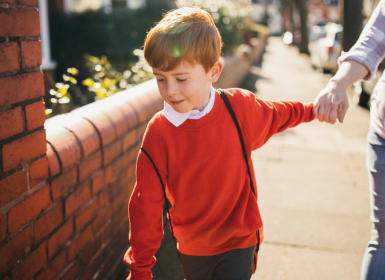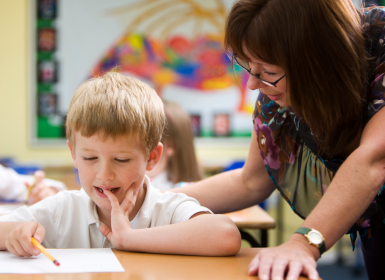What is Resilience?
Resilience is a subject that parents often ask about particularly when their child struggles with school, self-esteem or maintaining friendships. This article will explore the factors which need to be present to build resilience in children and practical strategies for parents and carers.
Resilience is a person’s ability to manage adversity and bounce back from difficult life events. When a child overcomes a challenge, they develop a sense of achievement. This success helps children to build confidence in their own strengths and prepares them to face future bigger challenges. Types of challenges could be anything from homework, making friends, moving to a new house, changes in schooling, bullying, parent separation or death of a loved one. Resilience can help the child bounce back from each of these life events. It also allows them to persevere and ‘have another go’ when things don’t work out the way they expected.
Resilience is a skill that can be learned by any individual, at any age and does not rely on a child’s ability or personality. Research has found that resilience can reduce the risk of childhood depression and anxiety, reduce the risk of developing adult mental health issues, and can be an indicator of success with study or employment[1]. A resilient child can adjust better with different events throughout their lives, is better able to manage and regulate their own behaviour, and will be better equipped to cope following trauma.
The Main Factors for Building Resilience in Children
Building resilience in children relies on several supporting factors. These factors create a safety net that helps to build the child’s confidence. While resilience can develop with just some of these factors, there is a stronger chance of building resilience in children when all of these factors are present.
The most important factor in resilience is for a child to have a network of caring and supporting relationships. These relationships may include parents, teachers, sports coaches, family or friends. It’s important that his network includes a trusted adult, within or outside of the family, who can provide reassurance, encourage the child to keep persevering, and identify the child’s strengths that could help overcome the challenge.
Having a realistic plan and achievable steps to be able to carry out the plan is also essential to building resilience. A good plan will clearly identify the challenge (e.g. there is a speech I need to present to the class next week), what strengths the child has (I really like the topic; last time I did a speech I did really well) and what challenges there are (I get nervous speaking in front of the class). An adult can be helpful in identifying further strengths or skills the child can use (“you know how to take 5 deep breaths to calm down before you start the speech; practice in front of mirror”). Once a child learns how to plan effectively they can start using this new planning skill when making new friends, battling through a hard video game level, managing bullies, or exams.
The child’s level of confidence in their strengths and abilities also plays a role in the development of resilience. If they lack confidence they may attempt to avoid the situation completely. Examples of avoidance include pretending to be sick to miss an exam or purposefully forgetting to bring an assignment to school. A simple strategy to help your child develop confidence is pointing out times when they did take a risk and they were successful. Another confidence building strategy is helping diffuse how big or scary the problem looks while encouraging a plan to tackle the problem in smaller steps.
Another important factor is good communication and problem-solving skills. It’s easy to assume that resilient children don’t need to ask for help, but a significant part of what makes them resilient is that they know when they do need help and then how to go about it successfully. Children who can express their plans and ideas well are also going to get better feedback from adults.
The final supporting factor is having good self-regulation skills to manage strong emotions and impulses. A child might understand that it is important to not get angry when playing board games or when they miss the goal at soccer but they may not have the emotional skills to manage their frustrations in the moment. It is much easier to teach these emotion regulation skills when the child is calm and not in the frustrating situation. Once the child has learnt this skill we can then encourage them to apply them to the situation. An early self-regulation skill to encourage is turn taking which practices sharing and inhibits their impulse reaction to take the toy off another child.
How Can we Help Children Build Resilience?
Fortunately, there are many ways to help your child develop resilience! The below strategies are evidence-based however some may relate better to your situation based on your child’s interests, strengths, and your parenting style. If your child already has great communication skills, try focusing on a strategy that will boost an area they haven’t mastered yet.
Developing attachment with your child
Resilience is dependent upon a child having strong, healthy relationships with adults. Therefore, focusing on your attachment with your child will subsequently help support the development of resilience. Attachment can be reinforced by using active listening skills, be in tune with your child’s needs and react consistently, or spend time with your child doing their favourite activities.
Giving responsibilities
Household chores can be a fantastic way to promote self-esteem, independence, pride in work, confidence in abilities, and a sense of belonging and importance to the family. Rewards for chores don’t always have to be money or lollies. Instead try rewards like choosing the movie for family movie night or Sunday night dinner. These types of rewards lead a child to internalise their successes rather than relying on external rewards like money to recognise their achievements.
Develop emotion regulation skills
Most kids can identify happy, sad, frustrated and angry but what they may struggle with is recognising why they are frustrated, what happens to their body when frustrated, and what they can do to help themselves. Instead of saying “leave your brother alone” or “stop yelling at him”, try to help them identify and manage their emotions by saying “I see you’re angry because you are shouting and your fists are clenched. You’re angry because Tom took the train. A better way is to tell Tom to stop or get help” or “I know your homework is stressful today because you’re getting frustrated. Do you want to try having a break or would you like some help?”.
By linking the cause and emotion and identifying an alternate action the child learns about their emotions, emotion regulation and problem-solving skills. As their insight develops you may notice your child begin to recognise their emotions quicker and create their own action plan to regulate themselves.
Community involvement
Community involvement has been identified as a protective factor supporting resilience development,[2]. It’s familiar advice that when a child struggles academically or suffers from bullying but they love sport to sign them up for sport lessons. This increases the likelihood of the child experiencing success and practicing their resilience skills in positive situations. An additional strategy is to encourage your child to tell their teachers and peers about their achievements at sport, music and dance concerts, volunteering, or fundraising efforts. This allows the student to extend the positive feedback from the positive situation back to their struggling situations.
Mindfulness
Research suggests that mindfulness not only improves resilience in children but could reduce parent stress[3]. An evidence-based smart phone app I’ve found beneficial to my clients is the “Smiling Minds” app. It is a free web and app-based program developed by psychologists and educators. It offers quick and easy-to-follow guided mindfulness programs catering for different age groups. Visit www.smilingmind.com.au for more information.
Support your child asking for help
Children often know they need help but don’t know how to ask in an effective way. For example, a child telling a teacher that another student is doing the wrong thing might get themselves in trouble for “tattle telling”. However, if the child can communicate the same situation as “Ben is teasing me and I need help because I don’t know what do to next” the teacher is more likely to offer problem solving help. The teacher’s response will also help pave the way for the child to know what to do in future conflict situations.
Check how your child asks for help by role playing and ask questions like “If you say this, what do you think the other person would say?” or “what happened when you tried this before?”. Role playing different situations like friendship issues has been shown to help increase confidence, improve planning, and reduce impulsivity[4].
Goal setting
If the challenge is too huge, encourage your child to develop a plan. Start with goal setting for highly motivated tasks, like making a chocolate cake or how to get past a tricky level on their computer game, and then transfer the skills learnt to less motivating tasks like practicing for a speech or confronting a bully. Don’t discourage them from making big goals but do help them identify whether their plan is realistic and give them positive feedback for their efforts. If a plan didn’t work, review it and figure out what might work better next time. The most effective plans are SMART (Specific, Measurable, Active, Reachable, Timed).
Modelling our own resilience strategies
Allow your kids to see your day-to-day struggles and what you do to overcome them. For example, you might let them see you practice what you will say to someone in the car or mirror, deep breathing, write a to-do list or action plan, or practice self-care to bounce back from a hard day. Modelling normalises that everyone experiences challenges and your child is more likely to feel comfortable to use similar strategies. Identify characters in your child’s favourite books, TV shows or movies that also model resilience and ask, “how would this character act in the same situation?”
Developing resilience with technology
As technology develops and our kids become more engaged with online learning it is important to encourage strong resilience skills to manage online bullying and self-discipline with how much time they spend online. A helpful start for parents is to be genuinely curious about your child’s online activities. For example, asking if anything interesting happened on social media, any photos from the party, or was it hard to find information for their science assignment.
These conversations pave the way for discussions around internet safety and resilience. When giving boundaries around technology it helps to provide the reasoning, for example, “We don’t have screen time after 8pm due to the backlit screen interfering with our natural sleep cycle”. This context will help a child accept the restrictions, develop insight which then leads to them developing their own self-discipline towards screen time.
Support for Building Resilience in Children
If you are concerned about your child’s resilience and would like support, counselling may be helpful to provide additional information and strategies for your child’s specific situation. Learning Links has registered and provisionally registered psychologists who can provide individual child and family counselling.
Some Helpful Resources
http://smilingmind.com.au/smiling-mind-app/
https://www.apa.org/helpcenter/resilience.aspx
[1] Macleod, S., Musich, S., Hawkins, K., Aslgaard, K., Wicker, E.R. (2016). The impact of resilience among older adults. Geriatric Nursing 37(4), 266-272.
[2] Carbonell, D. M., Reinherz, H. Z., & Giaconia, R. M. (1998). Risk and resilience in late adolescence. Child and Adolescent Social Work Journal, 15, 251-272.
[3] Bethell, C., Gombojav, N., Solloway, M., Wissow, L. (2016). Adverse Childhood Experiences, Resilience and Mindfulness-Based Approaches: Common Denominator Issues for Children with Emotional, Mental, or Behavioral Problems. Child and Adolescent Psychiatric Clinics of North America, 25(2), 139-156.
[4] Folostina, R., Tudorache, L., Michel, T., Erzsebet., B., Agheana, V., Hocaoglu, H. (2015). Using Play and Drama in Developing Resilience in Children at Risk. Procedia – Social and Behavioral Sciences 197, 2362-2368.




